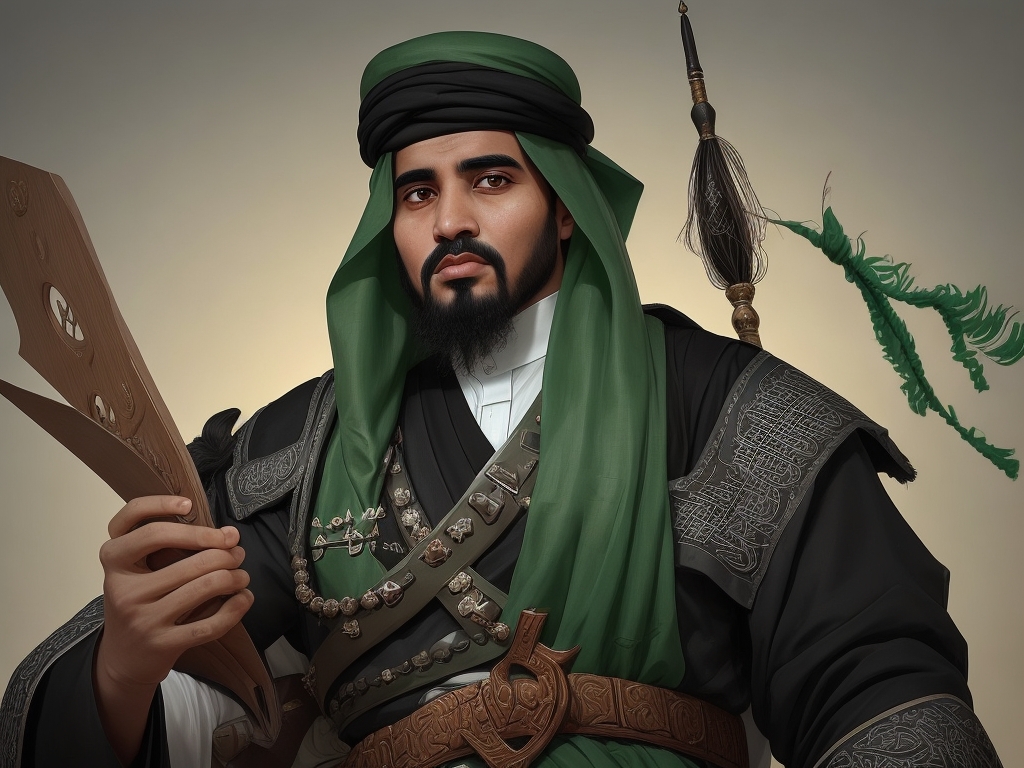Abdullah bin Rawahah
(who died in Jumada al-Awwal in the year 8 AH) was a companion of Badri, a poet, a military commander, and one of the twelve captains of the Ansar. He participated in the conquests of the Prophet Muhammad, and he was one of the poets who defended the Prophet Muhammad with his poetry. He was martyred on the Day of Mu'tah in the year 8 AH. He was the leader of the Muslims before the Romans and their Ghassanid allies.
His biography
Abdullah bin Rawahah bin Tha'labah bin Imru' al-Qais bin Amr bin Imru' al-Qais bin Malik al-Aghar bin Tha'labah bin Ka'b bin al-Khazraj belongs to Banu al-Harith, one of the branches of the Khazraj Azadi tribe. His mother is also from Banu Al-Harith, and she is Kabsha bint Waqid bin Amr bin Al-Atanabah bin Amer bin Zaid Manat bin Malik Al-Aghar. Ibn Rawahah was nicknamed Abu Amr, Abu Muhammad, and Abu Rawahah. He was the maternal uncle of al-Nu`man ibn Bashir, and Abu al-Darda’’s maternal brother.
Abdullah bin Rawahah was one of the first Ansar to convert to Islam, and he was one of the twelve Ansar captains on behalf of Banu Al-Harith from Al-Khazraj in the Pledge of Aqaba. He accompanied the Prophet Muhammad after his migration to Yathrib, and he brought brotherhood between him and Al-Miqdad bin Amr. Ibn Rawaha fought with the Prophet Muhammad in the Battle of Badr, and the Prophet Muhammad sent him after the battle to give good news of victory to the Ansar of Amr bin Awf, Khatmah, and Wael. He also participated in the battles of Uhud, Khandaq, and Khaybar, and the peace treaty of Hudaybiyyah. He witnessed the Umrah of Judiciary with the Prophet Muhammad, and the Prophet Muhammad commanded him on that day, saying: “Come down and move the stirrups for us,” so he chanted:
The Prophet Muhammad assigned him several duties. He appointed him as his successor in charge of Medina when he embarked on the Battle of Badr al-Mu’awad, and sent him as commander of a company of thirty men to fight Asir bin Razam, the Jew, in Khaybar, and he killed him. The Prophet Muhammad also sent him specifically to estimate the zakat on the palm trees and crops of Khaybar.
Ibn Rawaha was one of the few people who could write well in Yathrib. He was also an eloquent poet. He, Hassan bin Thabit, and Ka’b bin Malik were in charge of responding to those who satirized the Prophet Muhammad and the Muslims. Among his poetry was about the Prophet Muhammad.
The Prophet Muhammad chose Abdullah bin Rawahah to be the third Muslim commander in the Levant army, which faced an army of 200,000 Roman and Ghassanid fighters in the Levant. The Muslim army, which consisted of 3,000 men, camped in the district of Ma'an, and they heard the news of the Roman crowds. The first commander, Zaid bin Haritha, consulted his companions, and they said: “You have trampled the country and hidden its people, so leave.” Ibn Rawahah was silent, so he asked him, and he said: “We did not go for spoils, but we went out to meet them.” We are not fighting them with numbers or equipment, and the opinion is based on their direction.” They were informed that Heraclius had descended on Moab, so Ibn Rawahah encouraged the Muslims and said: “O my people, by God, what you hate is the one for whom you have borne martyrdom.”
The two armies met in Mu'tah in Jumada al-Awwal in the year 8 AH, and the Muslims faced a difficult situation due to the numerical superiority of the Romans. The first commander, Zaid bin Haritha, was killed, then the second commander, Jaafar bin Abi Talib, so the banner was transferred to the third commander, Ibn Rawahah, who hesitated a little.
Then Ibn Rawaha went down to fight and was stabbed. He received the blood in his hand and rubbed it on his face. Then he broke through the ranks and started saying: “O Muslims, sacrifice your brother’s flesh.” So the Muslims attacked until they overtook him, and they continued like that until they overtook him and he died in his place. Ibn Rawaha died without a son being followed.
His narration of the Prophet’s hadith
Narrated on the authority of: The Prophet Muhammad and Bilal bin Rabah.
Narrated by: Anas bin Malik, his nephew Al-Numan bin Bashir, Abdullah bin Abbas, Osama bin Zaid, and Abu Hurairah. Zaid bin Aslam and Ata bin Yasar
Al-Jarh and Ta’deel: Al-Bukhari, Al-Nasa’i, and Muhammad ibn Majah narrated hadiths by Ibn Rawahah in their books, just as Abu Dawud narrated to him in his book “Al-Nasikh wal-Mansukh.”

.jpg)
